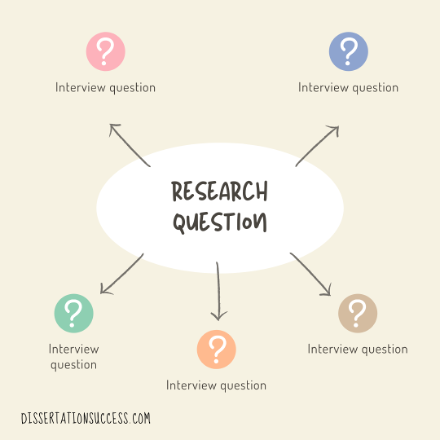Writing the Interview Questions
In my previous post, I showed you how to draft the research questions that are an extension of your problem and purpose statements. Now that I have my research questions, I need to write my interview questions for research. These are questions that I will ask my participants and will use personal pronouns such as “you” and “I” because we will be using this in a conversation with our participants.
Importantly, interview questions for research should be aligned to my research questions and reflect the themes from the literature. Because of this, it’s best to hold off on completely writing your interview guide until you’ve completed your literature review, or at least until you’ve completed your annotated bibliography for your literature review.
If you organize it well, you can draft some interview questions for research that you might like to ask your participants as you read research studies for your literature review. These can be questions you enter into your research journal that gets revised at the end. But this is a great way to have a large collection of questions from which to design your interview guide.
In addition to aligning the interview questions for research to my literature review, I also want to align them to my research questions. If I look at my three research questions, I might write three or so interview questions for each, knowing that I may add probing questions as I go to get more insight from my participants. In doing this, I will, by default, be aligning my interview questions to my theoretical framework, as two of my research questions contained the tenets of my theoretical framework.
See the image below:

Other considerations in writing your interview questions
Just like the research questions, there are considerations for your interview questions. The first is that in most cases – especially in a one-on-one interview – the interview questions should be open-ended. This allows the participant to answer in detail rather than answering yes or no. It’s easy to slip into writing closed-ended questions, so be sure to check your questions before you submit them to your chair for review. If you can answer yes or no to the questions, change them to open-ended “how” or “why” questions.
In addition to the open-ended nature of the questions, the questions should be conversational in a way that enables the participant to understand what you’re asking. Remember, even though your participants are living the phenomenon you’re asking about, they’re not schooled in the terms and jargon of your theoretical framework or research literature.
Check the readability score of your interview questions using online readability checkers like the one on plagarismsearch.com. Practice delivering interview questions and see how easily you can ask them and how they sound. Practice your questions with a friend or colleague, not for the purposes of collecting data but just to see if they think your questions make sense. We can get into a researcher ‘blind spot’ when we write interview questions, forgetting that these questions need to be for people not ensconced in scholarly literature and writing.
Finalizing the interview guide
As you pull together the various interview questions you have collected throughout your writing process, you will want to sculpt your draft questions so that they flow well and are not redundant. You will want to make sure that your interview questions are not focused too heavily on one aspect; they should cover the depth and breadth of the themes in your research. Depending on the number of interviews you will conduct with each participant, you also need to ensure that you consider how long it will take to get through the interview questions you have designed.
The final interview guide is for you to use during your interviews with participants. In many styles of qualitative research, the questions are just there for you to refer to, but not necessarily used in the precise order you have them listed because you are having a conversational encounter. Your participants, if given the time and space to answer your questions, may answer the question you have asked and address a later question, too. Be prepared to move seamlessly among your interview questions, pulling up the relevant question based on where the interview takes you.


Recent Comments